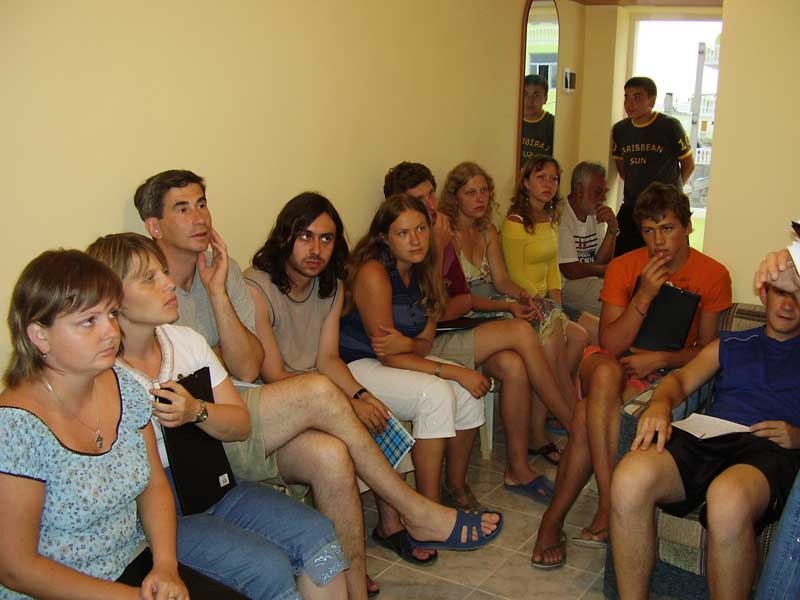Living History of the Testimonies All-Ukrainian Field Summer School on Holocaust Studies took place in the Crimea
 The participants of the all-Ukrainian Field Summer School “The Holocaust through the Eyes of the non-Jewish Population (Russians, Ukrainians, Crimean Tatars) on the Example of the Crimean Peninsula” attempted at recreation of the tragic pictures of the WWII in the Crimea basing on the witness’ statements. Field research by the associates of the Crimean Ethnographic Museum, university students, and senior high school students was done at August 4-12th, 2006 in Krasnogvardeyskiy region (former Kurman-Kemeltchinskiy) and Razdolnoye village (former Ak-Sheikh), where before the War lived a large Jewish population and existed Jewish national kolkhozes.
The participants of the all-Ukrainian Field Summer School “The Holocaust through the Eyes of the non-Jewish Population (Russians, Ukrainians, Crimean Tatars) on the Example of the Crimean Peninsula” attempted at recreation of the tragic pictures of the WWII in the Crimea basing on the witness’ statements. Field research by the associates of the Crimean Ethnographic Museum, university students, and senior high school students was done at August 4-12th, 2006 in Krasnogvardeyskiy region (former Kurman-Kemeltchinskiy) and Razdolnoye village (former Ak-Sheikh), where before the War lived a large Jewish population and existed Jewish national kolkhozes.
The Summer school was organised by Ukrainian Centre for Holocaust Studies (director Anatoly Podolsky). The author and manager of the project is Tatyana Velichko, postgraduate student of the Institute for Arts, Folklore, and Ethnology of NAS of Ukraine. “Unfortunately, there are few protagonists of Oral history method in Ukraine, that is why our Summer school became an important stage in qualifying specialists for the future work in the field. Usual history methods only when combined with oral history can give the general picture. – notes Tatyana Velichko. – because Jewish kolkhozes and neigbouring areas had polyethnic surrounding: Russians, Ukrainians, Crimean Tatars, Germans etc. – we were especially interested in their perception of the Holocaust and inter-ethnic relations of the pre-war period”.
Stories of the local dwellers-witnesses to those events made it possible to find one more place of execution of Jews in times of WWII in Bashennya str in Razdolnoye village. The place is now occupied by water tower. Besides the statements about the tragedy of Jews, participants gathered information about another great tragedy – deportation of the Crimean Tatars in May 1944; and even some information about deportation of Crimean Germans.
Publication of the collection of the gathered data is planned.
Announcements
MoreLatest News
-
Research and methodological seminar for educators in Lviv
On 15-16 June, we met with more than twenty participants - mostly teachers from Lviv - to discuss the memory of the Holocaust, other cases of genocide on Ukrainian territory, and the current challenges of working with these topics.
[More] -
History of genocides in Ukraine: studying the experience and challenges of the present. Seminar in Kyiv
On 12-13 June, a research and methodological French-Ukrainian seminar History of genocides in Ukraine: studying the experience and challenges of the present was held in Kyiv. It was organised by the Shoah Memorial (Paris) and the Ukrainian Centre for Holocaust Studies (Kyiv) with the support of the Kuras Institute of Political and Ethnic Studies.
[More] -
Educational Materials “Nazi Genocide against Roma in Ukraine, 1941-1944”
The tragic fate of Roma people during WWII still remains largely unknown in Ukraine and generally in Europe. The new educational materials play an important role in returning Roma history and culture into the history and culture of modern Ukraine, unveiling Roma cultural heritage and the tragic events of WWII genocide against them.
[More] -
(No) Children’s Stories Exhibition returned to Chernivtsi
In May-June 2024, Chernivtsi once again invited the interactive exhibition (No) Children’s Stories. This time, it was hosted by Chernivtsi Gymnasium No. 17, and initiated by history and law teacher Varvara Bodnariuk. The students of 7-9 grades volunteered to host the exhibition and during the month of the event, they gave tours to more than 400 people, including students from their school, other schools in the city, and even the mayor of Chernivtsi and a foreign delegation from Dusseldorf (Germany) with the mayor of the city.
[More] -
Learning From The Past - Acting For The Future seminar
On 18-19 May, the seminar Learning from the Past - Acting for the Future was held in Kyiv. It was a joint event of The Olga Lengyel Institute, New York, and the Ukrainian Center for Holocaust Studies, funded by the Olga Lengyel Institute for Holocaust Studies and Human Rights.
[More]




